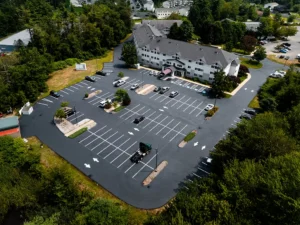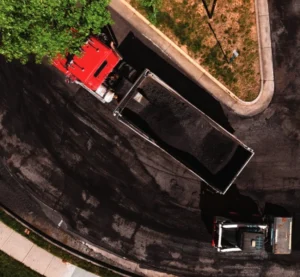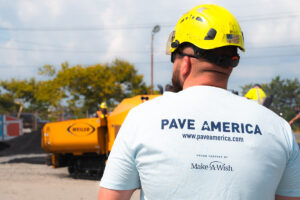On April 22, Earth Day events will be held around the globe in vigilant support for our planet and its well-being.
And if there is one thing professional paving crews know a thing or two about – it’s how to generate support.
Resembling traditional asphalt and concrete surfaces – yet widely regarded as a more attractive alternative – permeable paving systems are composed of a pervious or porous material atop a layer of crushed stone that first filtrates, then fosters, the passage of rainwater into the soil.
These eco-friendly paving systems are typically used for roads, walkways, patios, and parking lots that are subject to steady, light traffic.
Examples of permeable paving include:
- Pervious concrete/porous asphalt – Both are durable options that feature open spaces or voids that allow water infiltration and drainage into a “recharge” bed, while eliminating noxious run-off.
- Permeable Interlocking Concrete Pavers (PICPs) – Cost-effective and capable of supporting heavier loads, PICPs are concrete units linked by small stone or aggregate-filled joints that maximize groundwater recharge.
- Grass pavers/plastic grids – This eco-friendly paving option consists of a plastic grid in a honeycomb-like structure that can support a steady passage of vehicles. Open cells can be planted with grass seed, which creates the illusion of a lawn when fully grown.
Permeable paving helps to promote sustainability and protect the environment in the following ways:
- It manages runoff – Traditional pavement does not provide a viable place for stormwater to flow, resulting in a myriad of environmentally-harmful side effects from erosion to flooding to overtaxed water treatment facilities. Porous pavement, however, can significantly reduce runoff while allowing groundwater to be replenished. Permeable paving has also been shown to infiltrate up to 80 percent of rainfall, annually.
- It reduces pollution – Permeable, eco-friendly paving allows water to seep naturally into the ground, while serving as a filtration and cleaning system that traps suspended particles, solids, and heavy metals, and prevents these pollutants from infecting the surrounding environment .
- It incorporates recycled materials – Most grid paving materials are produced using recycled plastics, while manufacturing byproducts such as fly, ash, and slag cement can be partially substituted in permeable concrete, subsequently reducing or eliminating their space in landfills.
To learn more about eco-friendly paving options in your area, contact Pro-Pave today. Our crews have served properties throughout Maryland, Virginia, and Washington, D.C., for more than a decade. Call us at (703) 433-9500 or fill out our contact form online.



